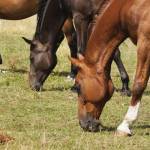Australian Stringhalt Prevalent among French Horses

French researchers studied 70 horses with Australian stringhalt from 2003 to 2008. All of the horses except one had a history of bilateral stringhalt, and all had grazed pastures containing the weed known as false dandelion or flatweed (Hypochoeris radicata sp.).
Horses diagnosed with Australian stringhalt display hyperflexion of the hind limbs and some degree of incoordination, and usually an abnormal, goose-stepping gait. In severe cases, horses find it difficult to move, especially when they are excited or nervous.
Removal of horses from infested pastures is often the first step in treatment. In this study, half of the affected horses were markedly improved after the weed was eliminated from the diet for eight months. Treatment with the anticonvulsant phenytoin accounted for rapid improvement in some horses.
The full article, titled “Longitudinal study of Australian stringhalt cases in France,” was published in the July 21, 2010 edition of the Journal of Animal Physiology and Animal Nutrition.








